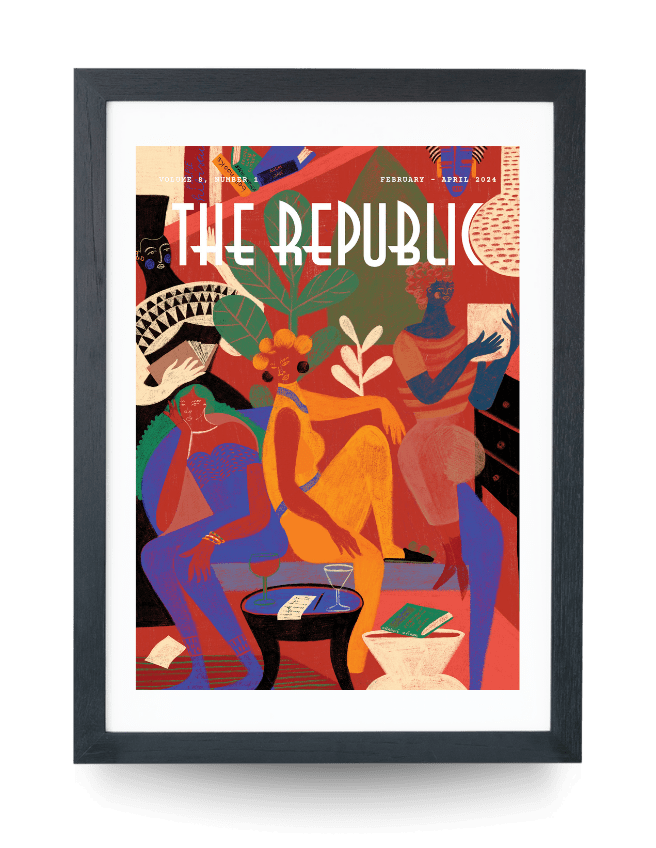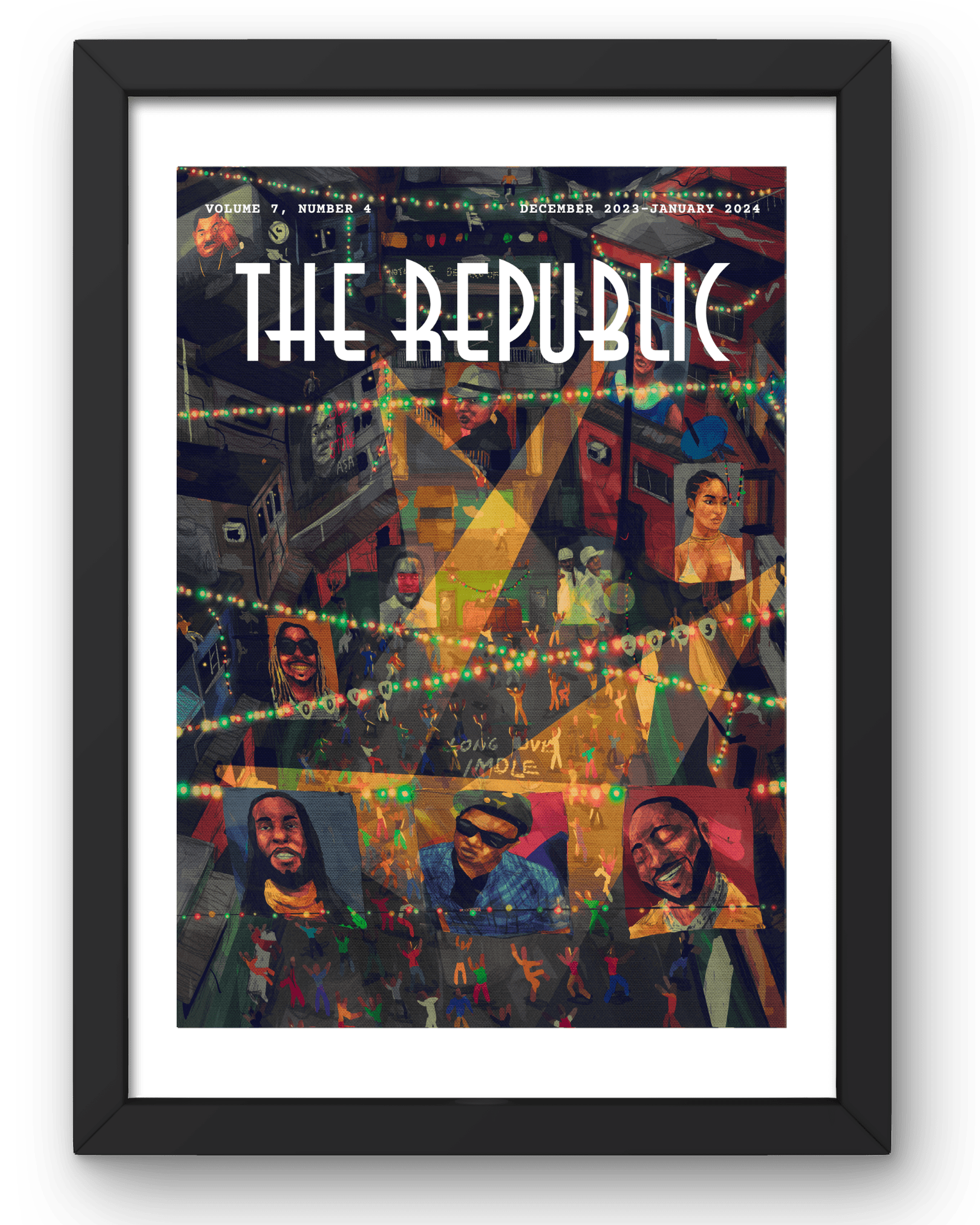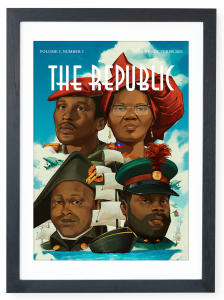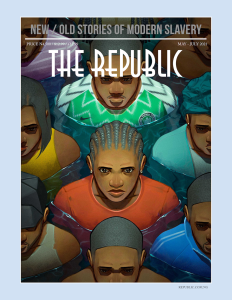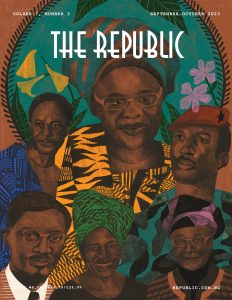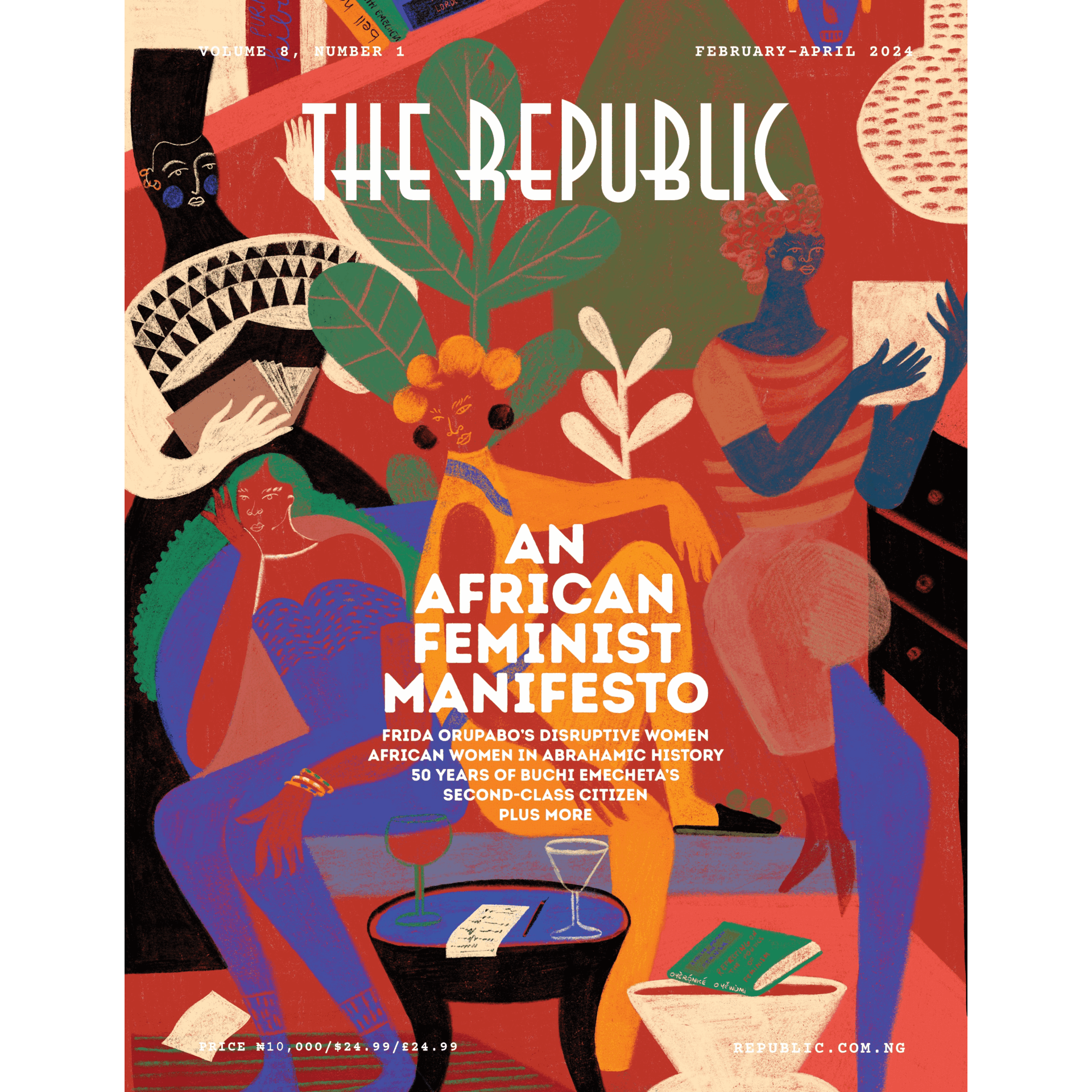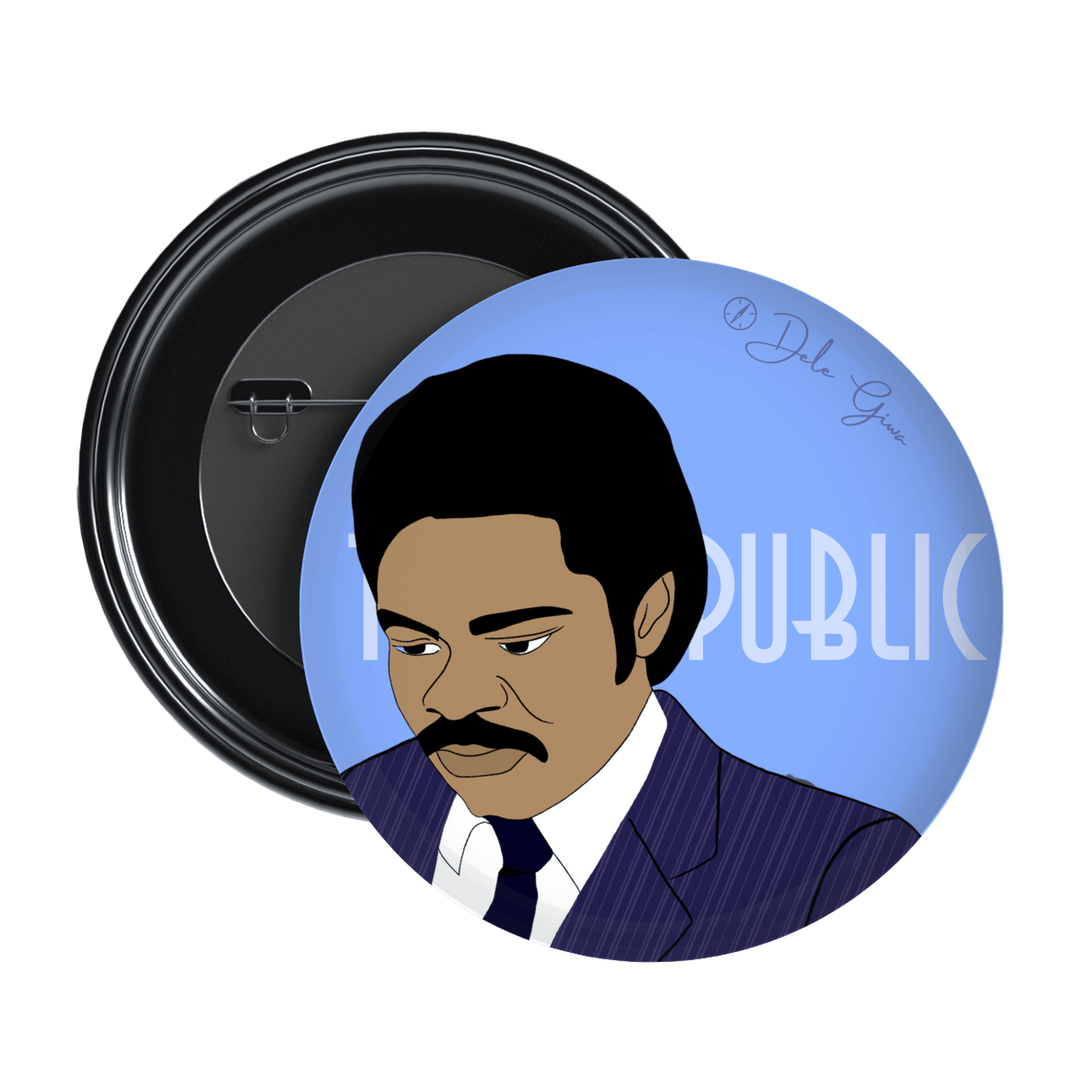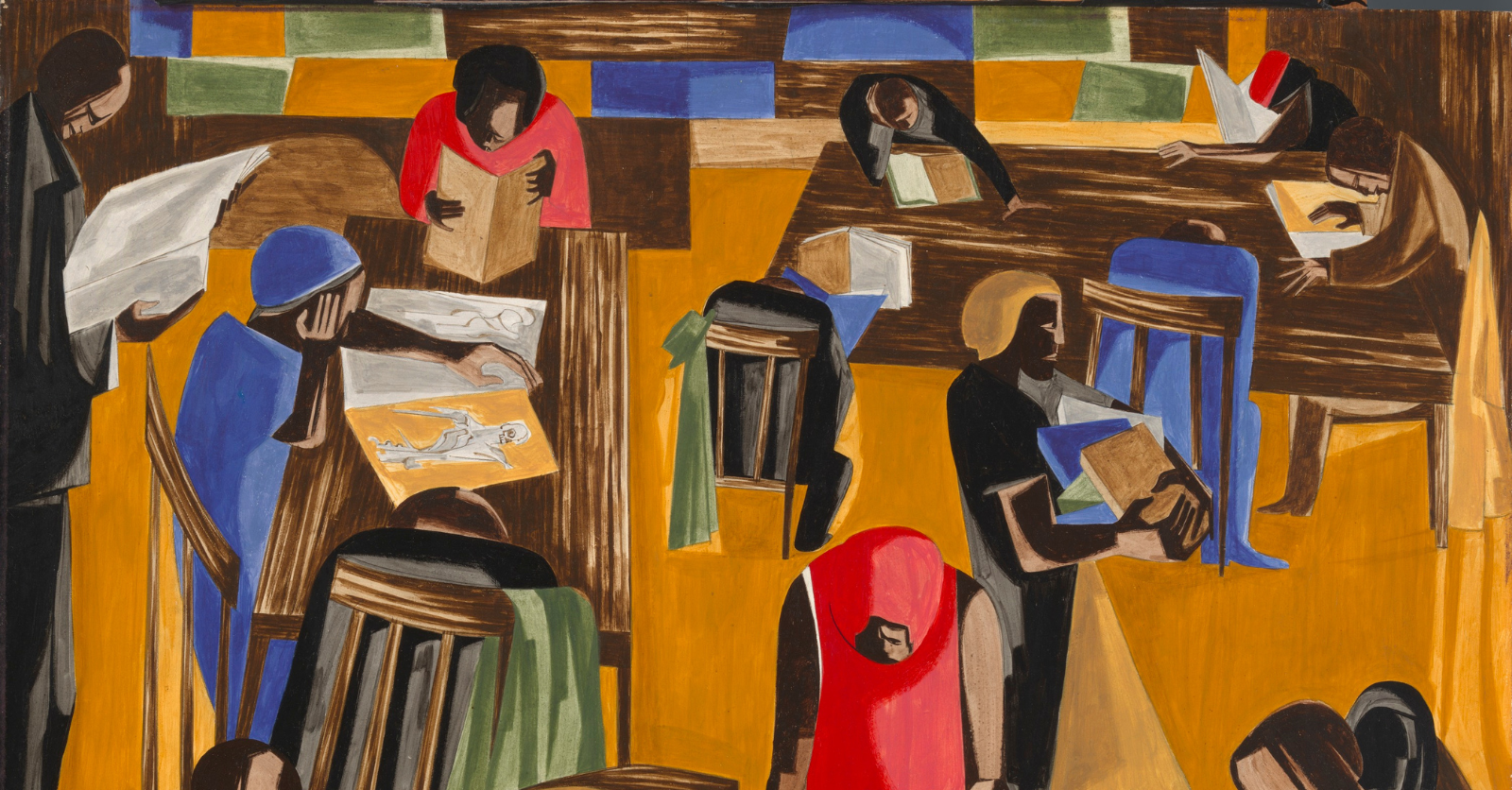
Jacob Lawrence, The Library, 1960. Smithsonian American Art Museum, Gift of S.C. Johnson & Son, Inc.
the ministry of ARTS / BOOKS DEPT.
A Principle for the New Nigerian Criticism

Jacob Lawrence, The Library, 1960. Smithsonian American Art Museum, Gift of S.C. Johnson & Son, Inc.
the ministry of ARTS / BOOKS DEPT.
A Principle for the New Nigerian Criticism
In every work of genius,’ observes the American essayist and philosopher, Ralph Waldo Emerson, in ‘Self-Reliance’, ‘we recognize our own rejected thoughts—they come back to us with a certain alienated majesty.’ Indeed, I find my thoughts coming back to me ‘with a certain alienated majesty’ from our critics’ recent argumentations about the new Nigerian literature. However, not all of their positions obviously were my ‘rejected thoughts’. Some I completely disagree with. And those that were actually echoes of my thoughts about the state of our literature were so rejected, among other motives, because of my understood inability to articulate them at the time of our acquaintance. However, it seems to me, from this hive of opinions, we are so invested in foregrounding our national identity onto our new literature that the critical practice itself has taken a back seat. The performance of literary criticism has been, rather unhelpfully, relegated for the theoretical reconstitution of our literature. Even though this reconstitution is also an important performance of criticism, our active disregard for discussing the principles of literary criticism—the ways and manners in which we read literature—nonetheless is a hindrance to the critical culture of reading we aim to establish through our theoretical insistences.
A PRELUDE TO PRINCIPLE
The consensus among these critics is that the current state of Nigerian literature is depressing. Our literature is not in decline, as the cliché of historical proportion goes; the critics conclude: we are writing total travesties. These intellectual elegies towards the kind of ‘Nigerianism’ our writers are perpetrating through their susceptibility to foreign sensibilities, however, have not been without sound suasions. Though the most convincing has to be the total disregard of active discussion of our literature—the lack of mainstream criticism in our flourishing literary tradition.
Even though I concede there is little to no economic prospect for literature and criticism in Nigeria, I am here least concerned about the state of Nigerian literature within the superstructures of economics and politics. Rather, I am concerned about the improvement of the quality of the work we are doing with the little we have in material substance.
The written Nigerian literature, despite our past and continuous achievements, is young. But in literature as in other fields, Nigeria has never been without talented performers. However, talent is insignificant, to echo James Baldwin. Just as mere good intentions and fine ideas are insignificant in a political office without the will and resolve to realize them. Therefore, in the presidential offices of the poets, novelists, and dramatists, the critics are the press corp. Their pens and papers worship at the altar of sincerity, holding the literary officials accountable for their strengths and weaknesses. Hence, the critic’s preoccupation with sincerity precipitates his paramount job of work: judgement, the basic principle of any criticism.
shop the republic
AGAINST IDEOLOGIES
As a proponent of principle for contemporary Nigerian critical practice, I am also less interested in critical scholarship than I am in literary criticism in its original sense of elucidating, analysing, comparing, and judging literature in a constructive and grounded manner for the reading public. In Nigeria, there has never been a tradition of mainstream literary criticism. The process of the academic tradition of reading we do have—courtesy of our universities—is slow. It is also anything but popular or public. For instance, peer-reviewed journals, in Nigeria as it is elsewhere, take more time to publish their accepted works than average mainstream journals. This does not mean, however, that the quality of critical scholarships being produced in academia is finer than the more accessible criticism mainstream outlets publish on a monthly, weekly, or even daily basis. For two reasons, the opposite is the case. First, the accepted—encouraged—language of academic scholarships is much more complex and obscure beyond literary criticism’s fundamental aim at clarification. Second, the academic method of literary analysis is largely ideological, the sort of perverse intellectual practice that subordinates literature to the darling triad of academia in politics, race, and gender. By merit of pickabacking literature to ideologies, academic criticism abdicates its fundamental responsibility of elucidation and passing judgement on the quality of the literary object under its critical consideration.
Indeed, literature is subordinate to nothing. ‘If literature becomes something more than literature’, the American literary critic, Alfred Kazin, ratiocinates in ‘Criticism and Isolation’, ‘it ceases to be literature at all.’ Also, the American modernist poet, Wallace Stevens, would define poetry as a self-substantiating entity unfolding freely around itself in both meaning and substance in the twelfth section of ‘An Ordinary Evening in New Haven’:
The poem is the cry of its own occasion
Part of the res itself and not about it
The poem speaks of the poem as it is.
‘The poem’ stands in for the whole of imaginative literature. Reading those lines, I wonder what multiculturalist, feminist, or Marxist reading could touch their simple, uncomplicated, total aesthetic relevance of self-definition. Although the imaginative work comes from the social, economic, political, cultural, and historical forces which serve as its background, these forces are simply that—backgrounds. It follows that if these forces could exist independently in the world while being influenced by other forces of consciousness in their turn, then what they serve as mere backgrounds to—literature, in this case—should be granted the same freedom of independent existence, to retain its autonomy despite their invariable influence on its construction.
No doubt these forces exist in the literary object. However, quarrying them from the poem, play, novel, and short story as though they are borrowed properties to be returned to their place in isolated interpretation is a violation of the artefact’s ontological freedom in the universe of ideas. It is an undemocratic act of ideological condescension, rendering the literary object a placeholder for the other disciplines of consciousness. Asking what poetry is for, as Stevens’s lines infer, is wildly irrelevant because literature is for itself and capable of meaning as such. But that particular question of social substance is exactly what the proponents of ideological criticism are insistent on asking literature, a question the American critic and scholar, Stanley Fish, concludes in ‘Harold Bloom’s Warning to the World’, ‘will not simply harm [literature], but destroy it.’
However, Fish himself has a theory of reading that the Nigerian writers’ combative reception of criticism suggests they would appreciate and even encourage us to take up. In ‘How To Recognize a Poem When You See One’, the pioneering essay on reader-response criticism in America, Fish concludes that ‘Interpretation is not the art of construing but the art of constructing. Interpreters do not decode poems; they make them.’ The criterion for recognizing a poem as such is to confer on anything the poetic status. Then, after the arbitrary poetic initiation, the thing recognized begins to take the form of poetry within our understanding of what we believe poetry to be. ‘If your definition of poetry tells you that the language of poetry is complex’, Fish continues, ‘you will scrutinize the language of something identified as a poem in such a way as to bring out the complexity you know to be ‘there.’’ Mere identification as such, according to Fish, makes poetry.
The outgrowth of this ‘distressing’ conclusion is clear. Using his critical skills to construct meaning instead of construing the same within the insight the techniques employed in the work gives off, the critic participates in the writer’s invalidation as a hierarchical entity on the plane of aesthetic discipline. If all critics adopt this method—as I believe any unambitious writer working in this nanny climate would want—then we lose any hope for comparison of imaginative strength between writers. Reasonably, should we comply with this view of reading, we would have no need for comparison of imaginative strength at all.
We would lose even more in the meaninglessness of judgement since whatever informed judgement any critic can make depends on the hierarchy of imagination and executive competence of the writers. Fish’s theory obliterates the possibility of both hierarchies because, without guiding principles for reading, the critical imagination can be as inventively far-reaching as the creative imagination. Therefore, as we hope to establish a unified motive for criticism in reading strengths and weaknesses in Nigerian literature, destructive propositions of hierarchy such as this should be disregarded with the same oomph of purpose we aim, in our more theoretical criticisms, to disembark our writers’ imaginative execution from foreign sensibilities.
Fish’s popular anti-foundationalist and unprincipled view of critical reading is, therefore, no less a destruction of the discipline of the imagination than the reductive views of the proponents of ideologies. Rather than being practically effective in critiquing literature as an independent existence in itself, reading from ideologies serves as nothing more than the legitimation and extension of those ideologies themselves, as Fish himself regards in ‘Why Literary Criticism is like Virtue’.
The ultimate problem with ideological reading of literature is that it often results in the ideological critic’s moral paroxysms being attended on the writer’s constitution of imagination and democracy of wit and judgement to choose not only what to express but also the proper way and manner to express it. The relevant prescription of aesthetic judgement is hindered. Instead of being criticized within the aesthetic and socially harmless confines of literature, the writer is held to account within the standards of which he has not prepared his literary work.
In Nigeria, I don’t see how reading texts through the limiting lens of ideology will help our young literature improve. I also don’t see how it helps our aim as critics to bring literature to the reading public with clear aesthetic demands. ‘To have great poets’, Walt Whitman writes in ‘Ventures, on an Old Theme’, ‘there must be great audiences too.’ But the greatness of reading, of being an appreciative audience of literature, has everything to do with actually reading literature for its own sake. It has nothing to do with reading literature as a placeholder for politics and other social superstructures.
shop the republic
THE UNBEARABLE NECESSITY OF JUDGEMENT
In ‘A Burden for Critics’, the American critic, R. P. Blackmur, declares that ‘Besides analysis, elucidation, and comparison, which Eliot once listed as the functions of criticism, criticism in our time must also come to judgement.’ This statement holds true for all time. Although it is my observation that writers so offended by criticism are not against ‘analysis, elucidation, and comparison’ per se. In fact, they cherish them. It is hardly an exaggeration to say that every writer anticipates the day to be read with as much attention as they give to the making of their work. Rather, what they have a problem with is what Blackmur refers to as the critical obligate: judgement. After all, it ‘is the critic’s best recognition.’
However, what Nigerian writers do not understand is that analysis, elucidation, and comparison are not enough components of criticism—especially in a distracted, superficial, and eerily self-absorbed age like ours—to succeed in its intellectual pursuit of supplementing literary quality with strict aesthetic demands. Since there are fewer true self-reflections in our world, even those instigated by others’ analyses of our works, judgement serves as the only persuasive map pointing writers towards the great mound of the best that is yet to be written and thought in our time. This is enough of a reason for the vocational legitimacy of judgement in our aesthetic vivisection of literature.
Likewise, our writers also seem not to understand that the act of writing itself is a judgemental act. That every writer writes selectively. For instance, writers elect some verbal techniques over others as the figurative vessels of their abstract ideas because those techniques prove to be better suited for their expressive aspirations. The critic, then, reads those elections as either remarkable or otherwise according to the objective techniques afforded the writer by his literary history and education. Judgement, then, is recreational. Even a ‘good criticism is something which must itself be criticized by the reader’, says T. S. Eliot in ‘A Brief Treatise on the Criticism of Poetry’. In summary, good criticism is judgemental while defying infallibility.
Despite the critic’s open-mindedness and uncertainty, judgement is as much a necessity for him—excepting those critics of lean resolve—as it is for the poet in his creative vocation, and the readers in their intellectual consumption. Judgement is not an orphan, then. Rather, it comes out of the critic’s apprehension of literature as a hierarchical art.
In addition, despite the essence of talent and imaginative hierarchy, the executive techniques of literature can be learned. The performance of imagination and literary education of the writer using these techniques, naturally expected to be both decisive and intentional, comes not through what but how he uses those techniques. And, since there are endless ways in which these techniques can be used to varied results, it is not illogical to assume that one writer will be better at constructing finer details of expression out of these techniques than others of little to no extraordinary touch of literary gift or ambition. That some poets will understand more than others that one particular technique is better at representing some human conditions. For example, the way irony is the technical go-to for satire and litotes the proper stop for the thorough amplification of the dreadful slightly repressed.
As long as these techniques offer distinctive impressions to our sensibilities in their varied employments, it is also not illogical to assume that sometimes their construction might be faulty resulting in them missing their mark. Or sometimes going too far away from the logical locality of the object of their representation. Or, sometimes, their presence is outright unnecessary. Therefore, critical judgement can be said to be an objective act—‘objective’ in the sense that John Crowe Ransom meant it in ‘Criticism Inc.’ in which it is the critic’s responsibility to ‘cite the nature of the object rather than its effects upon the subject.’ The ‘nature of the object’ is composed of these many yet distinctive literary techniques, the parts that form its meaningful whole. So, judgement is not only necessary in our time and country to check our writers’ inflated literary self-importance, false strengths, and shameless weaknesses—the trinity of which a critical tradition of niceties tends to propagate. It is also necessary for the survival of ‘the best that has been thought and said’, to echo Matthew Arnold from Culture and Anarchy, seeing to the continuation of our intellectual history.
In this case, critical judgement as an objective act is impossible without the thicker slice of literature it judges, as it is already intimated, being objective. Although the objectivity of literature that is heretofore referred and asserted is not to suggest that literature is written by formula. Far from it. Rather, objectivity is derived from the representative whole of the literary techniques out of which literature comes to be an object to be analyzed, elucidated, compared, and, ultimately, judged.
Even though the effects of these techniques will be different from one imaginative work to the next, they still retain their conventional associations of meaning. They are, in essence, forms to certain predictable insinuations. These objective parts make critical judgement not only a possible but also a necessary performance simply because of the meritocratic nature of the intellect and imagination out of whose harmonious marriage interesting literature emerges.
For instance, Carl Terver’s allusion to Kofi Awoonor in the ending of ‘Bombs Keep Going off in the Middle East’ in For Girl at Rubicon is less gripping than Loba Ridwan’s allusion to the first dialogues of Shakespeare’s King Lear in ‘Inheritance’ from A Boy’s Tears on the Earth’s Tongue. However, when these poems are taken whole, Terver’s poem is more aesthetically accomplished than Ridwan’s. When read in parts, with respect particularly to allusion, Ridwan’s allusion is more grounded and effortless than Terver’s. Although both poems are working with the same technique, the result cannot be more different in delivery. In the end, it is intrinsic merits like these that the serious and responsible Nigerian critic should aim to find, explicate, and appreciate, either endearingly or, when required, harshly, in his criticism.
shop the republic
CODA
I am neither rigid nor naive in my critical intellection to believe that critics’ perceptions, out of which their judgement emerge, can be incontrovertibly objective. ‘[T]he critical function,’ John Burroughs attested in 1899 in ‘Criticism and the Man’, ‘is mainly a judicial one.’ With constitutions and laws as its guiding principles, the thicker slice of the judicial judgement is an objective action. The thinner slice of it is subjective not only because these principles are open to interpretations affected by circumstances but because its final judgement on the litigants relies on individual people to be made, each with their own bias, prejudices, and convictions. The critic is merely given to speculations, the argument goes. I retort only in so far as the objective qualities of the literary artefact allow him. Therefore, the critic’s speculation—when his reading is serious, perceptive, and sincere to the technical properties of the literary object—is not only informed but evidently and objectively so.
As for the literary critic in the execution of his responsibility as a judiciary—analyzing, elucidating, and judging poems, short stories, novels, and plays—he should not trade in any form of obscurity. If reading literary techniques rather than sentiment and ideologies is his principle of criticism, as hereby proposed, then clarity should be his logistics. As opposed to academic scholarship, which has as its medium of discourse an antithetical language of elucidation, obscurity in literary criticism is the ultimate sin—a pretentious vestige of insincerity, a prefigurement to intellectual mischief. Because we aim to interest the Nigerian public in literature with literary criticism, it follows that our language should not be as private and subversive as the language of the writers whose works we aim to demystify. In other words, if the ultimate ambition of the new Nigerian critic is to bring order to the ‘anarchy of standards’—to echo the critics Margaret Marshall and Mary McCarthy through the seminal essay, ‘Like This or Die’, by Christian Lorentzen—in which our literature is currently entrenched, then his fundamental tool of engagement should be nothing short of clarity of language and of mission⎈




